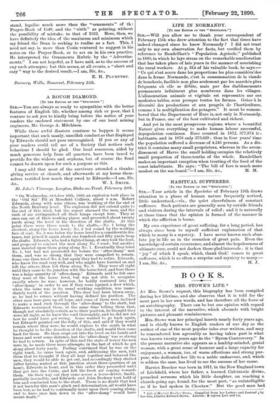A ROUGH DIAMOND.
[To THE EDITOR Olt THE "SPECTATOR"]
Sin,—You are always so ready to sympathise with the better features of English life, whether among rich or poor, that I venture to ask you to kindly bring before the notice of your readers the enclosed statement by one of our local mining engineers, Mr. George A. Mitchison.
While these awful diasters continue to happen it seems important that such manly, unselfish conduct as that displayed by Edwards should not pass unrecognised. If you or any of your readers could tell me of a Society that notices such behaviour I should be glad. Our local resources, aided by much generous help from all quarters, have been taxed to provide for the widows and orphans, but of course the fund cannot be drawn upon for such a purpose as this.
I may add that most of the survivors attended a thanks- giving service at church, and afterwards at my house them- selves testified how much they owed to Edwards.—I am, Sir, St. John's Vicarage, Longton, Stoke-on-Trent, February 10th.
"On Wednesday, October 16th, 1889, an explosion took place in the Old Sal' Pit at Mossfield Colliery, about 4 a.m. Robert Edwards, along with nine others, was working at the far end of the North Banbury level. The explosion did not extend quite to the end of this level, but the report alarmed the men, and the rush of air extinguished all their lamps except four. They at once ran out of their working places and proceeded about twenty yards along the level in the direction of the shafts. At this point there were three roads to the shafts,—No. 1 being the shortest, along the horse level ; No. 2 led round by the working face of coal; No. 3 was below the horse level for a considerable dis- tance, but joined it again about one hundred and fifty yards from the shafts. Edwards, who had a lighted lamp, at once took the lead, and proposed to conduct the men along No. 3 road; but another man insisted upon them going along No. 1. Eventually they tried No. 1, but had not proceeded far before the after-damp' met them, and was so strong that they were compelled to return. Some one then tried No. 2, but again they had to retire. Edwards, who knew the road very well, and who might have hurried on and left the others, then led them along No. 3. They were all right until they came to its junction with the horse level, and here there was a large quantity of after-damp.' Edwards said he felt sure they were at the horse level, but was not able to recognise exactly where he was ; however, he boldly ventured into the after-damp' in order to see if they were against a door which, when the mine was in its usual working condition, was imme- diately north of the junction. This door had been blown away, so he had to return without having defined his position. The other men here gave up all hope, and some of them were inclined to make a mad rush through the after-damp' to the shaft, but Edwards restrained them, at the same time telling them that, though not absolutely certain as to their position, he thought they were all right, as he knew the road thoroughly, and he did not see how he could have got wrong. Some wanted to go back again, but Edwards pointed out the folly of this, and said if they would remain where they were, he would explore to the south in what he thought to be the direction of the shafts, and would then come back for them. He then crept out into the level on his hands and knees and went some distance, but the `after-damp' was so strong he had to return. In spite of this and the state of terror the men were in, be made three more attempts, in the last of which he got along about forty yards. Feeling convinced that he was on the right track, be came back again, and, addressing the men, told them that he thought if they all kept together and behaved like men, they would ho able to get out, and accordingly they started (after baring waited at this junction about three-quarters of an hour), Edwards in front, and in this order they proceeded until they got into the Cruts, and felt the fresh air coming towards them. On their way out they came across a horse-driver, Smith, partially insensible, and Edwards and John Docksey took hold of him and conducted him to the shaft. There is no doubt that had it not been for this man's pluck and determination, all would have been lost, as he had to continually insist upon their coming along, and to have once lain down in the after-damp' would have meant death."






































 Previous page
Previous page